Cool Beans: Can 93 Degrees strike it hot?
A fourth-generation founder from the Bikanervala family is brewing a distinct journey with specialty coffee brand 93 Degrees Coffee Roasters. Can Mishthi Aggarwal be the roast of the town with her aud


Mishthi Aggarwal brews her masterclass with a volley of ‘hot’ questions. What is the best temperature for brewing coffee? Do you know what happens when you add hot water to coffee grounds? Does the taste of the coffee change if you are using too hot or too cold water? An economics graduate from the University of Nottingham who also has a management degree from Harvard University under her belt, Aggarwal opens a small bag of green coffee beans and rolls them on a table. “Do you know Karnataka accounts for close to 70 percent of the coffee produced in India?" the 27-year-old storyteller starts to engage the class with interesting coffee nuggets.
A small group of around a dozen students immerse themselves in an animated discussion. Some are studying in college and are brewing plans to start their food and beverage business, some are passionate cuppa lovers who are keen to know more about their beans, and there are a few who want to graduate from economy class to business class, which means they want to elevate their experience from consuming regular commercial coffee to the best version in the town. The young teacher manages to evoke an interesting reaction from the mixed brew. While a few young bean aficionados sound ridiculously bitter—do the coffee machines at marriage receptions churn out specialty coffee—others try to hedge their replies by resorting to wonkiness.

Aggarwal, the only woman specialty coffee roaster in India, encourages all kinds of answers. “I won’t judge you. It’s good to be stupid. That’s how we learn," says the certified ‘Q grader’ and an authorised Specialty Coffee Association (SCA) trainer. For a coffee to be considered ‘specialty’, underlines the young trainer, it must receive a score of at least 80 out of 100 points on the grading scale, which looks for a handful of attributes such as aroma, taste, aftertaste, acidity, cleaning, sweetness, uniformity, and balance.
A few minutes into the session, a pupil is gripped with hunger pangs. “Ma’am, I love the combo of coffee and samosa. May I quickly grab one and then continue with the class?" asks the foodie who was overwhelmed by the aroma of fried samosas that wafted across the enclosed space that doubles up as a dining area for consumers walking into the Bikanervala outlet at Sector 54 in Gurugram. The class breaks into a peal of laughter. “Let’s take a break," announces Aggarwal, as she joins us to share the unfiltered story of the fourth-generation founder from the Bikanervala family who dared to chart an independent entrepreneurial journey with 93 Degrees Coffee Roasters, a specialty coffee brand.
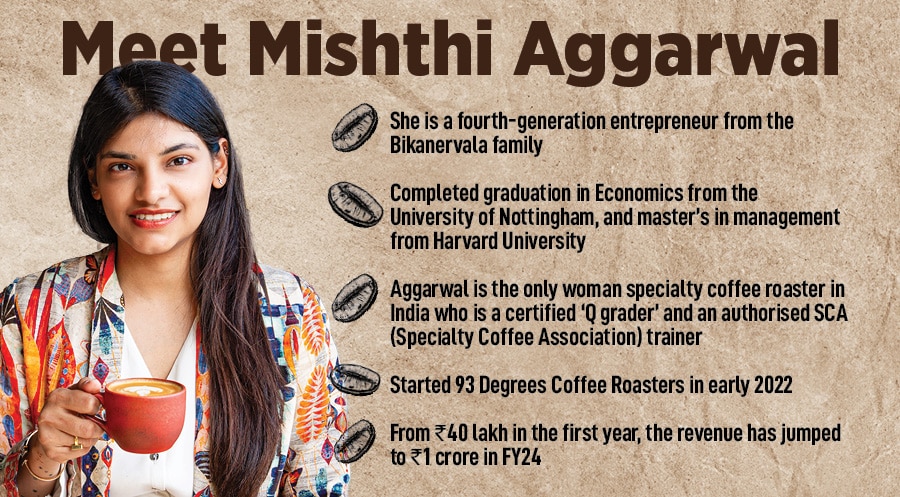
The trained coffee cupper starts narrating her tale like a seasoned storyteller. “There are five ‘Cs’ in any story," contends Aggarwal, dishing out the integral elements: Context, catalyst, complication, change, and consequence. “My story is no different," she says with a smile, and charts out the conventional narrative that was officially scripted by the family of the young woman. Teen saal graduation, do saal job, aur phir shaadi (three years of graduation, two years of job, and then marriage)… that’s how things were supposed to pan out. Given the context—in traditional Marwari business families girls are not expected to rebel usually, they get married as soon as they graduate and in the decades-old Bikanervala family, no woman had either ventured outside the country to pursue higher education or started her own business which diverged from the family business—Aggarwal was privileged in getting some leeway.
The young woman, however, wanted complete control. She wanted to roast her destiny and shared her audacious plan: Studying abroad and then deciding her future. “Everybody was against my decision," she recalls. Family members and relatives kept lobbying the rhetorical reason: Nobody had ever gone abroad in the family. “Koi karega tabhi to baaki kar paayenge (somebody needs to do so that others can follow)," Aggarwal tried her best to convince them. Nothing worked. The story, though, took an interesting turn when a catalyst entered the frame. “My father stood by me. He was my biggest pillar of support," she says, adding that her father, Manoj Aggarwal, director, Bikanervala Foods, confronted everybody and sent his daughter to the UK.

Once in England, Aggarwal’s story encounters another ‘element’ in the form of green beans. The young student was impressed by quaint local cafes, trendy artisanal roasteries, and the vibrant specialty coffee culture. Her world changes, and she decides to brew a specialty coffee brand. Now comes the third ‘C’—complication aka obstacle. She is faced with a problem and a choice. The problem was obvious. How can somebody from a business family that has been into sweets and savoury snacks, get into coffee, and that too specialty coffee? The family was visibly stunned. “You know your grandmother is the only one in the family who drinks coffee. Rest are tea lovers," Aggarwal was made to see the reality.
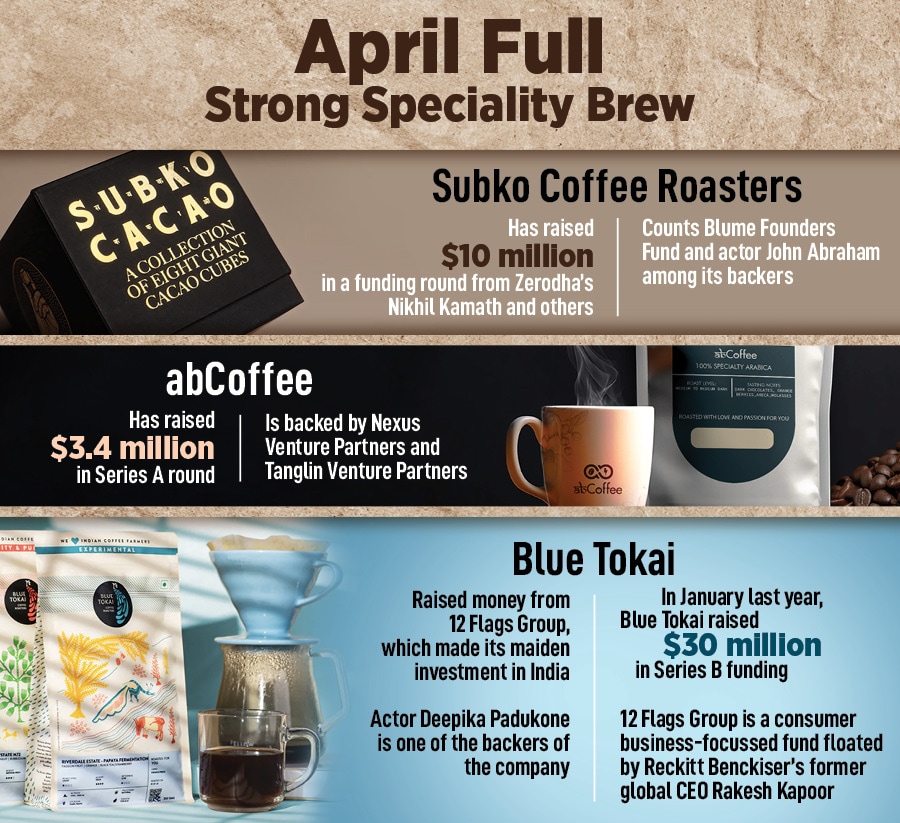
There were sceptics outside the family as well. “Specialty coffee will remain niche. It can’t be a volume business," said one of the business advisors close to the family. After much brainstorming, which was triggered by the relentlessness of the wannabe founder to stick to her guns, a middle path was devised. “Take care of the London unit of Bikanervala and you can open a coffee store next to it," was the offer on the table. Aggarwal remained adamant, completed her graduation in 2018, and started learning the basics of business with her father, who was initially reluctant to give in to the idea of starting a coffee brand but eventually ceded when he realised his daughter’s passion for coffee. From the US to London to Australia, Hong Kong, and Dubai, Aggarwal’s father sent her to the best possible places to immerse herself deeply in the education and business of specialty coffee. Though trials started towards the end of 2019, the plan was disrupted by the pandemic. Undeterred, the young founder started brewing from her home and started selling coffee within her residential society.
The warm response encouraged the daughter-father team. After multiple iterations, Aggarwal rolled out 93 Degrees Coffee Roasters in early 2022. Two years later, the specialty brand has more than doubled its revenue from Rs 40 lakh to Rs 1 crore. The young entrepreneur is delighted with the progress. “We place a premium on sourcing high-quality, sustainable coffee beans directly from the farmers," she says, adding that ethical sourcing ensures freshness and maintains the integrity of the beans, resulting in exceptional taste. There are other direct benefits. Aggarwal explains. Emphasis on ethical practices ensures that farmers are treated fairly, and coffee is sourced sustainably which has a positive rub-off on the well-being of coffee-growing communities. From the roasting process to the final cup, meticulous attention is paid to every detail. “Each batch of beans is roasted to extract the fullest flavour, and blind taste tests ensure that only the highest quality coffee makes it to cafes and shelves," claims Aggarwal.
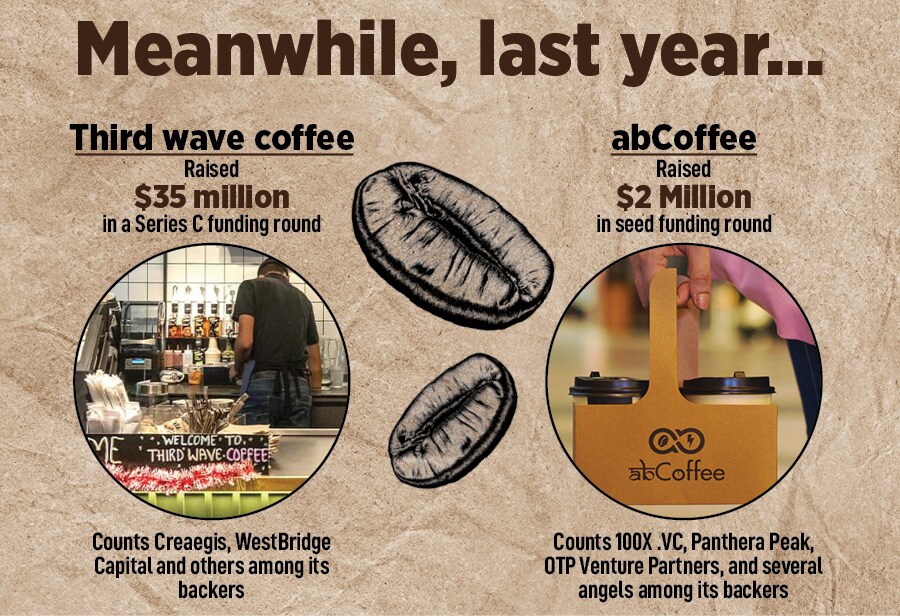
Marketing and brand experts are impressed with the ambitious plans of the young founder. “Coming from the house of Bikanervala, what she is trying to do is something dramatic," says Harish Bijoor, who runs an eponymous brand consulting firm. “It’s not tea but coffee," he says, trying to add context to a flurry of Specialty coffee players—Blue Tokai, abCoffee, Subko Coffee, and Third Wave Coffee—that have dotted the coffee landscape in India over the last few years (see box). “There have been five waves of coffee revolution in India," he says.
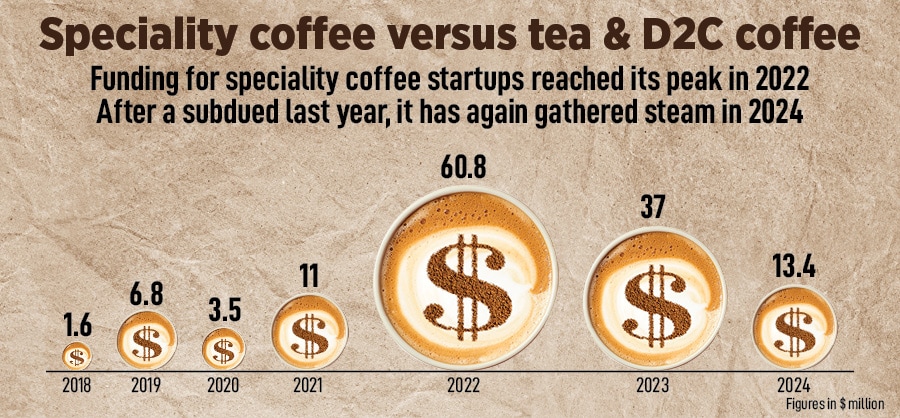
The first wave was the bottom of the pyramid, which started with Udupi restaurants and standalone, pony eateries that offered coffee in South India. This wave, which originated over six decades back, continues to be the biggest coffee wave that India has seen. “There are as many as 26,000 coffee outlets of this kind in South India," he says. The next wave was Café Coffee Day, which massified coffee. “The brand attempted McDonaldisation of coffee," he reckons. The likes of Barista, Costa, and Starbucks brought the third wave. Then, new-age players such as Blue Tokai and Third Wave are higher on the coffee hierarchy. “The fifth wave will be the extremely gourmet end of the coffee," he says, adding that all the waves have only added to the enduring appeal of coffee. “Coffee is sexy, and tea is boring," says Bijoor.
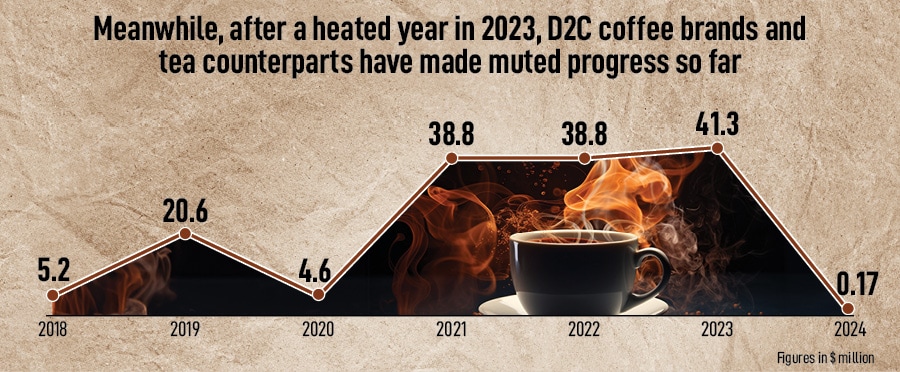
Industry observers too reckon that the wave of specialty coffee fanned out because of decades of sprawling coffee culture. Increasing disposable income and a steady rise in out-of-home consumption and delivery provided an impetus to the coffee industry. “With growing knowledge due to widespread inbound and outbound travel, and social media, consumers started to demand more," reckons KS Narayanan, a food and beverage expert. This gave rise to the culture of coffee roasters, premium packaged coffee, and DIY (do it yourself) coffee-making equipment. Brands started to differentiate and create a niche by sourcing high-quality beans from single origins, small batch-wise roasting, working with the farming community, and adopting fair trade practices.

Despite a promising beginning, new-age coffee players will have to contend with a slew of bitter realities. Vikram Khurana, Aggarwal’s mentor, and CEO of Kaapi Solutions, points out a few challenges. Starting a coffee business in India comes with its fair share of challenges. “Many young entrepreneurs get caught up in the rush for quick profits, especially in the specialty coffee segment, which can seem overhyped," says Khurana. However, what truly sets successful roasters apart is their ability to stay patient and prioritise consistent quality. While conceding that the coffee landscape has become increasingly competitive over the last few years, Khurana underlines that only a handful of roasters manage to adapt, learn, and maintain a consistently high standard of coffee. “It"s crucial for them to continuously scout for high-quality green beans," he says.

Back in Gurugram, Aggarwal tells us why the wave of specialty coffee will gather steam. “The tastes of consumers have evolved and they are making a conscious choice to adopt a sustainable way of consumption and life," she says. Though aware of the biggest challenge of being a bootstrapped specialty coffee player—you can’t expand aggressively—Aggarwal prefers to look at the silver lining. “Even a niche can be a mass and volume," she reckons. “We are spearheading a sustainable coffee revolution in India," she signs off.
First Published: May 10, 2024, 12:37
Subscribe Now